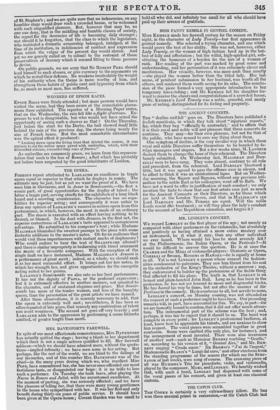MR. LINDLEY'S CONCERT.
WE regard LINDLEY as the first player of the age ; not merely as compared with other performers on the violoncello, but absolutely and positively as having attained a more entire mastery over an instrument, be it what it may, than any other individual we ever heard. Where would his loss be most severely felt? at the Philharmonic, the Italian Opera, or the Festivals ?—It would be difficult to answer this question. He is at once the CRAMER and the Moni of violoncello-players : Oratorio or Opera, CORELLI or SPOHR, ROSSINI or HANDEL—he is equally at home in all. Yet is not LINDLEY a person whose concert the fashion. ables condescend to patronize. They saw him thrust from his seat in the orchestra of the King's Theatre, without a murmur ; nay, they endeavoured to bolster up the pretensions of the feehle thing that affected to fill his place. The truth is, that LINDLEY is an honest and plain-hearted John Bull. Long as he has been in the profession, he has not yet learned its mean and disgraceful tricks. He has bowed his way to fame, but not after the manner of Sir Pertinaxin the comedy. He is courteous to all, but servile to none. LINDLEY'S concert, on Monday evening, was not attended as the concert of such a performer ought to have been. Our preceding remarks will, in part, have accounted for this. We say, in part—for we are honestly bound to confess, that it did not offer much attrac- tion. The instrumental part of the scheme was the best ; and, perhaps, it was fair to expect that it should be so. The band was complete in every point ; for LINDLEY'S professional brethren, at least, know how to appreciate his talents, and are anxious to show him respect. The vocal pieces were scrambled together in great confusion. Some were omitted (the only glee, for instance), and the arrangement of most inverted. There were also inversions of another sort—such as Monsieur BEGREZ warbling "Gentle;' or, according to his version of it, "Genteel Airs," and Mr. BEN- NETT singing " Cruda amor." DE BEGNIS'S "J'ai de l'argent," Mademoiselle BLASI S'S " Lungi dal caro," and other etceteras from the standing programme of the season (for which see the SPEC- TATOR of last week), were sung of course. The crowning piece of all was HUMMEL'S Trio for pianoforte, violin, and violoncello, played by the composer, MORI, andLiNDLEy. We heartily wished that, with such a band, LINDLEY had dispensed with some of the vocal pieces of his concert, and given at least one classical sinfonia.


























 Previous page
Previous page